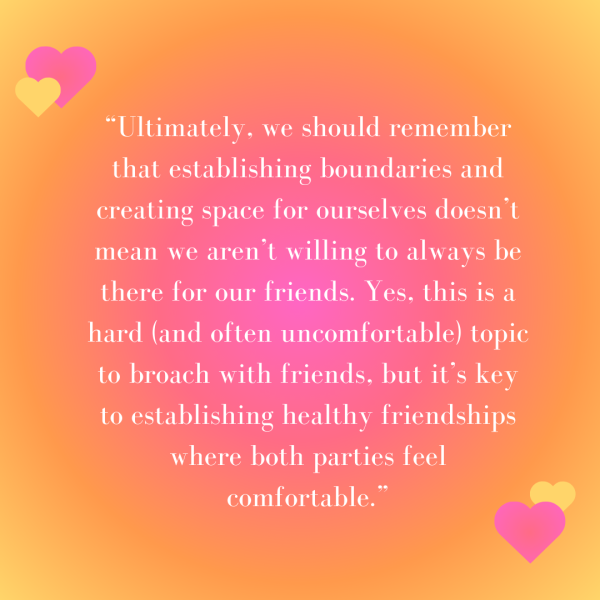We all have that one friend — the one often deemed the “parent” of the group and the one you turn to first when you need guidance. The therapist friend is the designated go-to for emotional or mental support, always available to listen to everyone’s problems and give advice. However, while some may see someone who fits this role as the ideal friend, the truth is, the “therapist friend” trope can be damaging to the friend who fills these shoes.
While talking with a trusted confidant can often relieve feelings of stress and help people cope, sharing trauma with a friend may lead to trauma dumping: the act of unloading one’s traumatic experiences onto someone else without regard for its impact on the other party. When we trauma dump, we force the listener into the role of an emotional caretaker nonconsensually. Our audience may feel uncomfortable while we discuss sensitive topics, but they may not be able to find the opportunity to opt out of the conversation.
It’s important to differentiate between healthy venting and trauma dumping. Healthy venting involves expressing emotions and frustrations to someone willing to listen and provide feedback in a balanced conversation. Trauma dumping, on the other hand, is usually a one-sided conversation that often leads to the person on the receiving end feeling overwhelmed, drained or uncomfortable. This creates an unhealthy dynamic that may soon feel like a one-sided friendship. It’s not normal, or healthy, for one friend to be expected to carry all the emotional baggage of their other friends simply because “they can” or “they give good advice.”
This isn’t to say you shouldn’t share your frustrations or struggles with your friends at all. If your friends are emotionally available, they can provide strong support to help you through listening. They can also offer different perspectives and insights into specific situations. However, the “therapist friend” trope becomes damaging when we start sharing details about difficult topics or experiences without the listeners’ consent because our friends haven’t been trained as therapists to be able to process heavy and emotionally taxing conversations.

Rather, it’s important to communicate with your friends and draw boundaries on what each friend is OK with talking about. A topic one person considers OK to share may be upsetting or triggering for another to listen to. It’s also important to note that these boundaries can change over time, and that’s OK, too. In general, asking permission before diving into a deep conservation is essential.
Additionally, if you are discussing a more sensitive topic, consider the impact of what you’re saying and how the conversation is going. For example, if you notice you’re dominating the conversation and the listener seems uncomfortable, take a pause. Ask if the listener would like to opt out of the conversation, if they would like to share or if they’d prefer to continue the conversation. Form clear boundaries on any topics you consider off-limits or want to discuss with caution and establish mutual consent when discussing potentially triggering subjects.
Ultimately, we should remember that establishing boundaries and creating space for ourselves doesn’t mean we aren’t willing to always be there for our friends. Yes, this is a hard (and often uncomfortable) topic to broach with friends, but it’s key to establishing healthy friendships where both parties feel comfortable.
The “therapist friend” isn’t a therapist, and they shouldn’t be expected to act like one.










